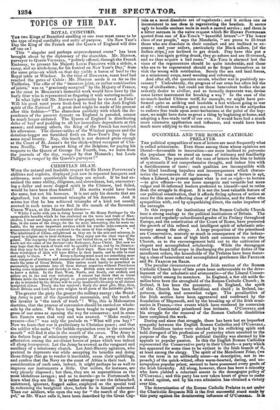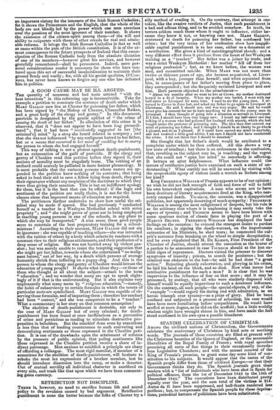O'CONNELL AND THE ROMAN CATHOLIC PRELATES.
THE political sympathies of men of letters are most frequently what is called aristocratic. Even those among them whose opinions are liberal—favourable to innovation—are more inclined to patronize the populace than to stand on terms of intimacy and familiarity with them. The pursuits of the man of letters form him to habits of systematic if not comprehensive thought, and imbue him with a fastidiousness of taste : such qualities are incompatible with the blind headlong impulses and inconsequences which charac- terize the movements of the masses. The man of letters is apt, when a Liberal, to protest against what is not en re'gle—to lecture —to give offence—to see more energetic and versatile but more vulgar and ill-informed leaders preferred to himself—and to retire from the struggle in disgust. It is not the least valuable feature of our political constitution, that it affords fitting spheres of action at once for this more reflecting class of politicians, and for those who sympathize with, and by sympathizing direct, the ruder impulses or the untaught.
In this respect the institutions of the Roman Catholic Church
bear a strong analogy to the political institutions of Britain. The- various and regularly-subordinated grades of its Prelacy throughout Europe, and the constitution of the Court of Rome, have promoted the growth of this refined and intelligent spirit of scholastic aris- tocracy among the clergy. A large proportion of the priesthood are Conservative, scarcely so much in consequence of the induce- ments offered to men of high birth and connexion to enter the Church, as to the encouragement held out to the cultivation of elegant and accomplished scholarship. While the demagogue talent has found full scope in discharging the peculiar duties of the mendicant orders, the households of the Prelates have been foster- ing a class of benevolent and accomplished gentlemen like FENELON and ST. FRANCIS DE SALM The peculiar circumstances of the Irish rection of the Roman
Catholic Chnrch have of late years been unfavourable to the deve- lopment of the scholastic and aristocratic—of the Liberal Conser- vative spirit among its members. In England, a few old noble fa- milies have been the stronghold of the Roman Catholic Church ; in
Ireland, it has been the peasantry. In England, the spirit of this Church has been fastidious and timid ; in Ireland, im- petuous, daring, and somewhat vulgar. The peculiarities of the Irish section have been aggravated and confirmed by the- foundation of Maynooth, and by the breaking up of the Irish semi- naries in France,—two events which have rendered its connexion with the Continental priesthood less intimate. O'Costeeit and his struggle for the removal of the Roman Catholic disabilities have completed the work.
During and since that struggle, there has been but an imperfect
sympathy between the English Roman Catholics and O'Cosineee.. Their fastidious tastes were shocked by his rollicking spirit and bold disregard of his professions of yesterday when unsuited to the purpose of the day. Their political timidity was alarmed by his appeals to popular passion. In this the English Roman Catholics represented the Conservative party in their Church—a party which has appeared for some time to be extinct in the Irish branch of it, at least among the clergy. The spirit of the Mendicant Friar, (we use the term in no unfriendly sense—as descriptive, not in re- proach,) of the quick-witted, often warm-hearted, daring, and un- scrupulous popular priest, seemed to have possessed every grade of the Irish hierarchy. All along, however, there has been a minority who have yielded a reluctant assent to the demagogue policy of O'Cosnseer ; and this party has now taken heart of grace to make a stand against, and by his own admission has obtained a victory over him,
The determination of the Roman Catholic Prelates to act un,der the Charitable Bequests Bill is the first successful stand made by this party against the domineering influence of O'Cortztau.. It is an important victory for the interests of the Irish Roman Catholics; for it shows the Protestants and the English, that the whole of the body are not blindly led by the power which one man exercises over the passions of the most ignorant of their number. It shows the existence of the citizen-spirit among them—of the will and ability to cooperate with those of other creeds for real and attain- able reforms. It brings the Irish Roman Catholics in fact as well as name within the pale of the British constitution. It is of the ut- most consequence to the future prospects of Ireland that this eman- cipation of the Roman Catholic body from the absolute dictation of one of its members—however great his services, and however gratefully remembered—shall be permanent. Indeed, mere per- sonal considerations render it necessary for those who have ven- tured upon this act of successful insubordination to maintain their ground firmly and warily ; for, with all his genial qualities, O'Coe- asEee has never been known to forgive any one who has defeated him in politics.























 Previous page
Previous page